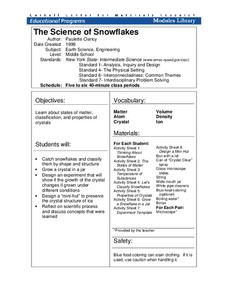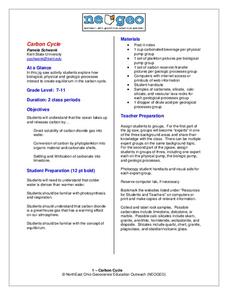Minnesota Literacy Council
Scientific Method
Here is a resource with a descriptive approach to explaining the scientific method. It's simple, but effective for both introduction and reinforcement of this concept.
Center for Learning in Action
Introduction to Matter
Begin your states of matter lessons with a demonstration designed to introduce the concept that all matter has properties. Reinforce this concept through vocabulary exploration, and the creation of atom models; salt, water, and carbon...
University of Texas
Lives of Stars
Stars exist from a few million years to over 10 billion years, depending on their mass. Scholars perform a play acting as stars to learn about their different life cycles. They develop an understanding of many of the fundamental concepts...
BioEd Online
Center of Gravity
Between the pull of gravity and the push of air pressure, it's a wonder animals can balance or move at all. With a hands-on lesson about the center of gravity, learners discuss their own experiences with the topic, then work with...
Baylor College
Energy Sources
Take the concept of burning calories to a more literal level in the second of seven lessons about energy in the realm of food and fitness. Using simple materials, groups will burn breakfast cereal and a pecan to see which one gives off...
Center for Learning in Action
Density
Explore the concept of density within states of matter—gases, liquids, and solids—through a group experiment in which young scientists test objects' texture, color, weight, size, and ability to sink or float.
Cornell University
Scaling Down: Effects of Size on Behavior
Two activities explore the concept of size, especially small sizes down to the nano. Scholars practice determining volume, mass, and density and calculate exponential increases and decreases. They then predict and test the effect of size...
Teach Engineering
Quantum Dots and Colors
Introduce teams to quantum dot solutions with an activity that has them expose solutions to a blacklight, observe the colors, and take measurements. Groups graph the data and analyze the dependence between particle size and color...
Colorado State University
How Can I Turn a Solar Oven into a Refrigerator?
Whether you want to heat things up in science class or cool things down a bit, an intriguing lab's got you covered! Science scholars explore the principles of thermodynamics using a solar oven, then change the conditions to turn their...
Science Matters
Energy Transfer and Transformation
When you take a simple task and create an exceptionally difficult way to complete it, it is known as a Rube Goldberg machine. These machines are filled with many types of energy transfers and energy transformations. Here, pupils watch...
Science Matters
Peanut Energy
How do humans get energy since they aren't mechanical and can't photosynthesize? Learners explore this question by relating potential energy in food to human energy levels. Scholars measure the change in mass and a change in temperature...
Curated OER
Roller Coasters
Twisting and turning through the sky, roller coasters are popular attractions at amusement parks around the world, but how exactly do they work? Explore the physics behind these thrilling rides with an engineering design activity....
KOG Ranger Program
Fire Behavior in Forests
Understanding the ways a fire will act is a key factor in fire safety and fire prevention. Young campers focus on how the weather and terrain can affect the behavior of a fire with topographic maps and different scenarios.
Norwich Institute for Language Education
Simple Machines
Planning a unit on simple machines? Save some time and energy with this collection of lessons and activities that explores how these devices are used in the real world to make life a little easier.
Science 4 Inquiry
An Investigative Look at Florida's Sinkholes
In May of 1981, the Winter Park Sinkhole in Florida first appeared and is now referred to as Lake Rose. Scholars learn about the causes of sinkholes through an inquiry project. Then, they analyze recent data and draw conclusions to...
Foundation for Water & Energy Education
What is the Water Cycle? Activity A
Hydrologists create a concept map about how water is used and a sentence strip defining water and describing its unique properties. Small groups work together to fill a small milk carton and compute the mass of water inside. The next...
Teach Engineering
Amusement Park Ride: The Ups and Downs in Design
Groups design the ultimate roller coaster by considering potential and kinetic energy. They test their designs using marbles and then go on to rate each group's design based on aesthetics, loop diameter, and cost.
Cornell University
The Science of Snowflakes
Who can grow the best crystals? Challenge class members to develop strategies for enhancing growth in the crystals. Through a lab investigation, learners study the properties of crystals and test the effectiveness of different growth...
NOAA
Into the Deep
Take young scientists into the depths of the world's ocean with the second instructional activity of this three-part earth science series. After first drawing pictures representing how they imagine the bottom of the ocean to appear,...
Discovery Education
STEM Camp—Urban Infrastructure
Build a bridge to learning in a STEM-aligned unit about urban infrastructure. Young engineers explore the many aspects of civil planning and design in a five-day unit. Content includes the challenging aspects of balancing building with...
Science Matters
Electricity and Magnetism Formative Assessment #2
Leave it to science to get scholars out of a jam. Young scientists use what they've learned about electricity and magnetism in the previous eight lessons in the series to build tools that will allow them to find their way out of the...
NASA
Two Versions of Gravity: Newton and Einstein
We have all heard the debate about teaching both theories, but an innovative lesson takes the discussion to a new level. Scholars research and debate Newton's Law of Gravitation versus Einstein's General Theory of Relativity with...
Colorado Unit Writing Project
Simple Machines
Planning an elementary science unit has never been simpler! These twelve lessons guide young scientists through an exploration of simple machines and their many uses in the real world before asking them to apply their learning in the...
NorthEast Ohio Geoscience Education Outreach
Carbon Cycle
Using a jigsaw approach, earth science experts teach each other about the physical, biological, and geologic components of the carbon cycle, with a specific focus on the ocean.
Other popular searches
- Physics Concepts Momentum
- Physics Concepts on Pressure
- Physics Concepts Motion
- Physics Concepts Force
- Physics Concepts Light
- Physics Concepts 24
- Different Physics Concepts
- Physics Concepts Flight

























